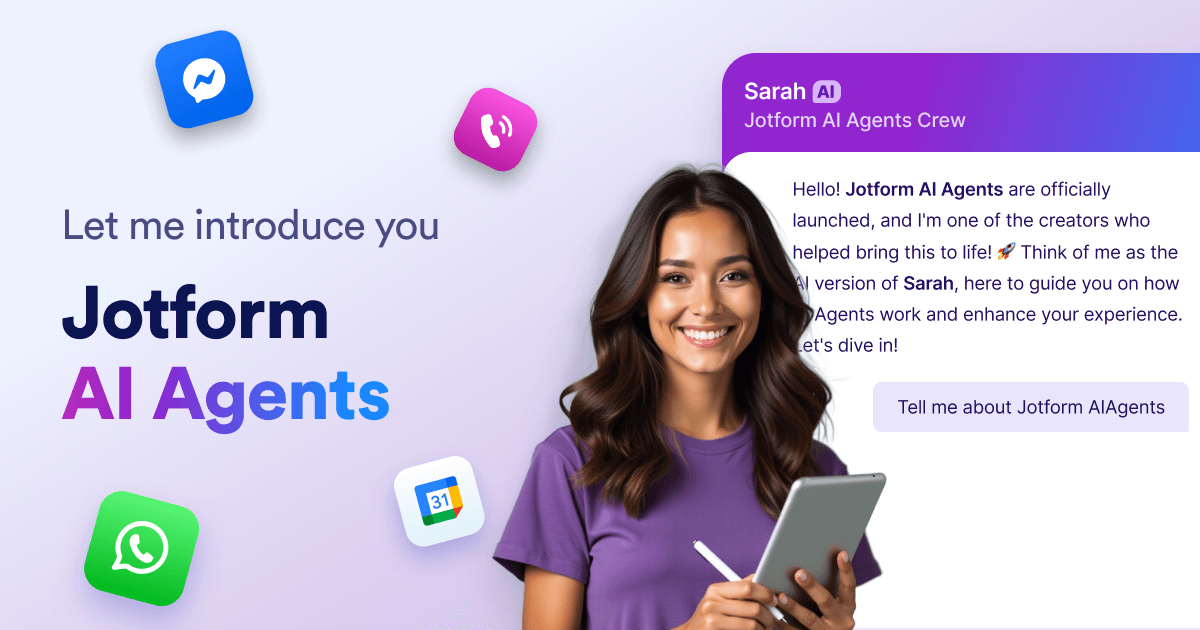The Form Factor: Why AI Is Reinventing the Most Overlooked Tool in Business

Forms are everywhere in business—from capturing leads and onboarding clients to gathering internal feedback and processing payments. But let’s face it: while they power most of our data workflows, they’re not always loved. They can feel clunky, slow, or disconnected from the systems we rely on.
That’s changing fast. AI isn’t replacing forms—it’s making them smarter. From auto-completing fields and validating entries in real time, to summarizing responses and routing data to the right place, AI is helping forms evolve from static inputs to dynamic workflows.
Which brings us to the rise of AI agents.
AI Agents: Build on Forms and Process in your Business
In the past eighteen months, large-language-model chatbots have evolved from novelty interfaces into agentic systems—specialized digital workers that execute domain-specific tasks with minimal supervision. These agents sit on your public site, WhatsApp channel, or internal portal and act on a curated body of knowledge—answering questions, initiating workflows, and writing back to your data layer in real time.
A noteworthy development came in February 2025, when Jotform released its no-code AI Agent Builder. This platform integrates retrieval-augmented generation (RAG) with form logic, allowing non-technical users to upload PDFs, policy docs, or URLs and instantly deploy a conversational agent that honors those sources. A public directory of thousands of templates soon emerged, spanning customer service, HR, finance, and education—suggesting that the technical barriers to entry are rapidly falling.
While Jotform's entry into the space is promising, it's important to note that we expect many more platforms to emerge in the months ahead. We'll be actively testing and evaluating different tools and builders, and we'll continue to share our findings as the ecosystem matures.
Three Representative Use Cases
| Business Context | Agent Capability | Value Proposition |
|---|---|---|
| E‑commerce | Dynamic FAQ, inventory look-ups, email capture for abandoned carts | Reduces support backlog; improves conversion by providing immediate, accurate answers |
| Local Services (salon, plumbing, coaching) | Calendar integration, automated reminders, contextual upsell suggestions | Compresses scheduling overhead; increases average booking value |
| Sales & Service | Lead qualification, product queries, support escalation routing | Speeds up response time; keeps pipelines warm and improves handoff to humans |
Because the agent layer is channel-agnostic—web widget, WhatsApp, or social messaging—you configure the knowledge base once and scale assistance around the clock.
Strategic Rationale for SMEs
- Minimal Technical Debt – Drag-and-drop deployment means no backend refactor or API wrangling.
- Governed Knowledge – The agent is constrained to the artifacts you upload, mitigating hallucination risk and preserving tone of voice.
- Structured Data Exhaust – Every dialogue is persisted as clean, queryable records that can feed CRM, analytics, or compliance workflows.
Reflect: Where Could an AI Assistant Lighten the Load?
- Repeated questions – Which answers do you or your team type over and over?
- Missing-info moments – Where do customers stall because guidance isn’t instantly available?
- Copy-and-paste workflows – Which internal tasks feel mechanical every week?
- Hidden knowledge – What PDFs or policies already exist but aren’t searchable?
Use these prompts to surface areas where a lightweight assistant might remove friction—no coding required.
Final Thought: Why This Matters Now
The emergence of accessible agent platforms like Jotform signals a turning point in making AI tangible for everyday business. From automating event logistics for the Burgess Group to replacing manual workflows for solo entrepreneurs, the results already speak to significant efficiency gains:
- Time saved
- Staff overhead reduced
- Lead generation made interactive
- Customer satisfaction boosted
With thousands of ready-made templates, multi-language support, native integration with tools like Google Calendar and Slack, and the ability to embed agents directly on websites or share them via unique links, platforms like this are shaping the early contours of what AI agents can do.
We’re watching closely. If you've ever wished for a tireless assistant who knows your business documents inside-out and never sleeps—this may be your moment.



Member discussion